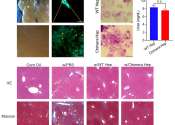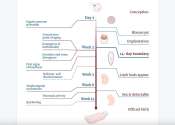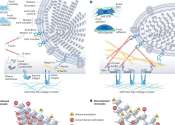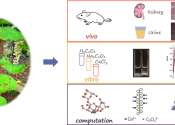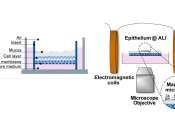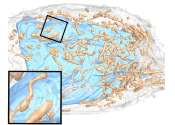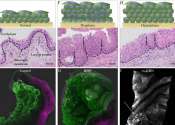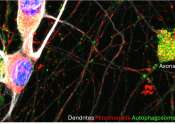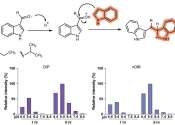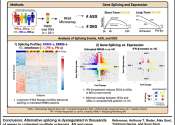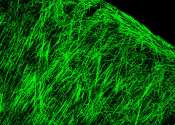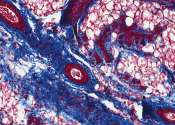Last update:
Medical research news
Medical research
Llama nanobodies: New therapy can neutralize a wide variety of HIV-1 strains
A research team at Georgia State University has developed tiny, potent molecules that are capable of targeting hidden strains of HIV. The source? Antibody genes from llama DNA.
1 hour ago
0
0
Medical research
New study finds cell donor's socioeconomic status shapes cancer treatment outcomes
A research team led by the University of Minnesota Medical School demonstrated that the socioeconomic status (SES) of cell donors affects the health outcomes of blood cancer patients who underwent hematopoietic cell transplantation ...
2 hours ago
0
0
Scientists discover switching off inflammatory protein leads to longer, healthier lifespans in mice
Scientists at the Medical Research Council Laboratory of Medical Science and Imperial College London have discovered that 'switching off' a protein called IL-11 can significantly increase the healthy lifespan of mice by almost ...
3 hours ago
0
0

World-first international guidelines weeds-out potentially critical scientific fraud
The number of retractions issued for scientific research articles in 2023 exceeded 10,000—smashing annual records. To date, publishers have struggled to clean up a slew of papers with serious integrity concerns.
20 hours ago
0
1
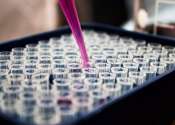
Study: Roles of PEDF in exercise-induced suppression of senescence and its impact on lung pathology in mice
A new research paper titled "Roles of pigment epithelium-derived factor in exercise-induced suppression of senescence and its impact on lung pathology in mice" has been published in Aging.
23 hours ago
0
7

Phytic acid-based nanomedicine shows promise for metabolic dysfunction-associated steatohepatitis therapy
Metabolic dysfunction-associated steatohepatitis (MASH) is one of the most common chronic liver diseases, primarily caused by metabolic disorders and systemic inflammatory responses. Although the incidence of MASH is gradually ...
22 hours ago
0
0

A treatment for metastasis? Using ferroptosis to attack migrating cancer cells
A treatment for metastatic cancer—researchers at Friedrich-Alexander-Universität Erlangen-Nürnberg (FAU), the University of Innsbruck, the Massachusetts Institute of Technology (MIT) and Universität Würzburg have now ...
Jul 16, 2024
0
46

New study finds early detection of miRNAs in maternal blood may offer potential for predicting preeclampsia
Preeclampsia (PE) is a significant contributor to the increase in maternal morbidity and mortality worldwide, with particularly alarming numbers in the United States, where it affects about 2–8% of pregnancies, resulting ...
Jul 16, 2024
0
8

Nearly half of reviews that assess harm in biomedical research found to contain some type of spin
An international team of researchers specializing in spin and reporting bias created a framework to provide guidance for authors, peer reviewers, and editors to recognize and rectify "spin," or the misleading reporting, interpretation, ...
Jul 16, 2024
0
0

Protein droplets likely don't cause Parkinson's, study suggests
Liquid-liquid phase separation is not a precursor to formation of amyloid fibrils, a pathological hallmark of Parkinson's disease, shows a recent study. Rather, the formation of protein into liquid droplets may help to dissolve ...
Jul 15, 2024
0
12

Could a health care provider's nonverbal behavior modulate pain reports and placebo effects?
Research assessed the effects of the nonverbal behavior of health care providers on pain reports and placebo effects in 51 males and 53 females randomly divided into four groups. The results revealed no differences between ...
Jul 15, 2024
0
0

Health research on South Asian communities must be led by South Asians, say researchers
Funding agencies in Canada need to review their policies for evaluating research proposals to ensure that South Asian research is conducted by South Asians, write authors in a commentary, titled "A call to stop extractive ...
Jul 15, 2024
0
0

All stem cell therapies are not created equally: Some don't have many stem cells at all, researchers find
Researchers from University of California San Diego have found that two of the most frequently administered stem cell therapies, which are often used interchangeably, actually contain completely different types of cells. ...
Jul 12, 2024
0
29

New study used 3D-printed sensors to measure spinal cord malformations in embryos
A group of scientists at UCL have successfully created mechanical force sensors directly in the developing brains and spinal cords of chicken embryos, which they hope will improve understanding and prevention of birth malformations ...
Jul 12, 2024
0
20

Revising biomedical research reviews: International ethics experts urge consideration of societal and long-term impacts
In biomedical research involving human subjects, research ethics committees around the world have traditionally emphasized individual rights and protections for participants, including informed consent. The emerging field ...
Jul 12, 2024
0
0

Blood fat profiles confirm health benefits of replacing butter with high-quality plant oils
Switching from a diet high in saturated animal fats to one rich in plant-based unsaturated fats affects the fat composition in the blood, which in turn influences long-term disease risk. A recent study published in Nature ...
Jul 11, 2024
0
146

New protein drug trial produces promising safety results for rare pulmonary condition
A multicenter safety study at UC Davis Health tested a protein drug (INBRX-101), developed to improve care for people with alpha-1 antitrypsin deficiency (AATD), and showed the therapy is quite safe.
Jul 11, 2024
0
17

Charting an equitable future for DNA and ancient DNA research in Africa
Today, the American Journal of Human Genetics published a perspective piece on the need for an equitable and inclusive future for DNA and ancient DNA (aDNA) research in Africa. The paper, coauthored by an international team ...
Jul 11, 2024
0
0

Study identifies new target in critical pain-regulating brain region
Chronic pain affects approximately 20% of the United States population and 30% of the global population. Along with sensory manifestations, chronic pain conditions also are associated with high rates of comorbid depression ...
Jul 11, 2024
0
1
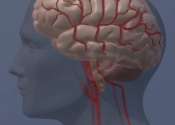
Examining whether administering blood transfusions before hospital arrival improves trauma patients' survival
In the military trauma setting, prehospital transfusion (PHT) is a firmly evidenced means to reduce preventable death. It stands to reason that the same would be true in the civilian emergency medical service (EMS) setting, ...
Jul 11, 2024
0
0


























